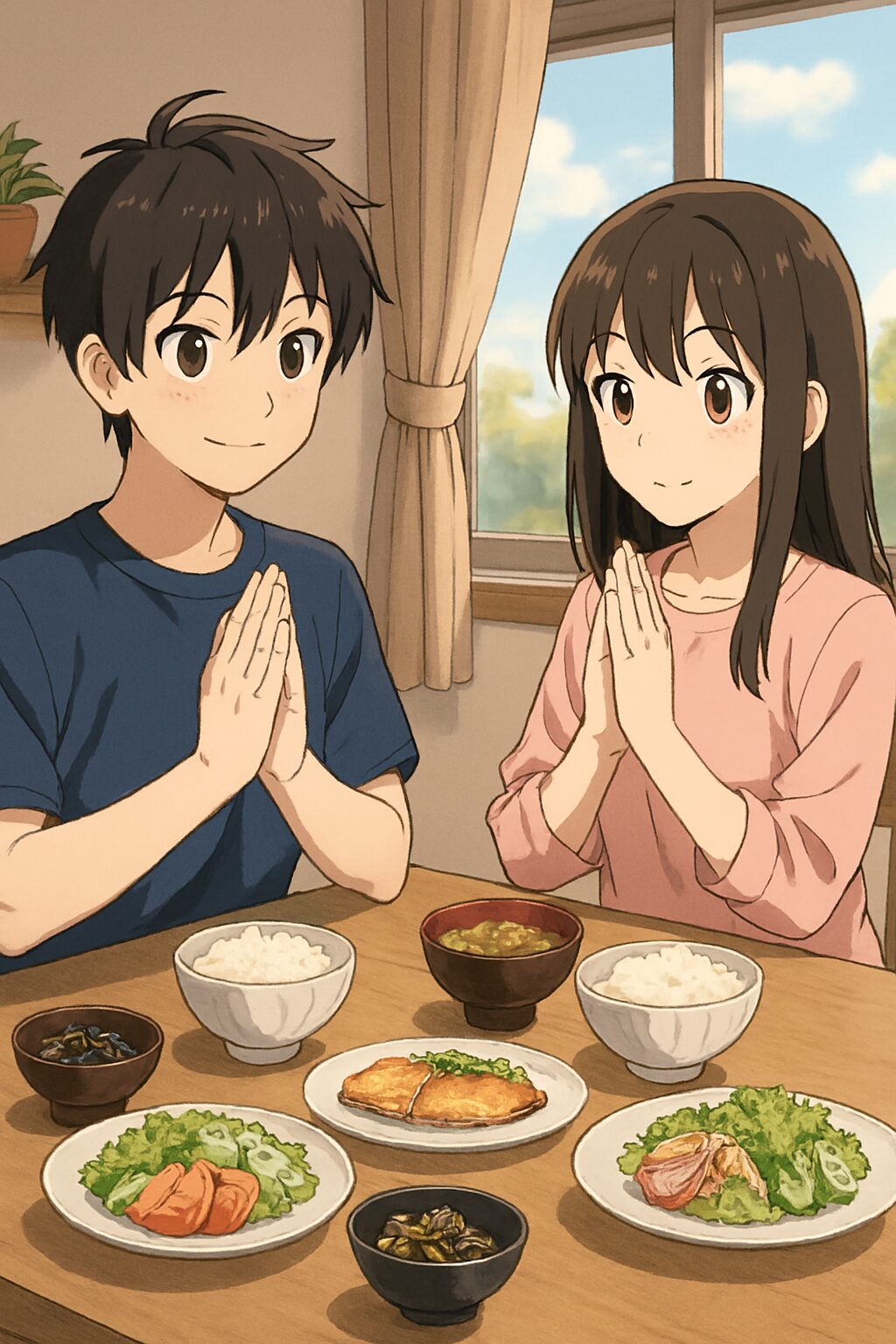- How Two Simple Phrases Reflect Japan’s Philosophy of Gratitude and Life
- What Does “Itadakimasu” Really Mean?
- Why Do Japanese People Put Their Hands Together?
- What “Itadakimasu” Teaches Us
- The Meaning of “Gochisousama”: Gratitude After the Meal
- How Do Other Cultures Express Gratitude Around Meals?
- Are These Phrases Disappearing?
- Conclusion: Two Words That Can Change How We Live
- 食べる前と後の一言が語る、命と感謝の哲学
- 「いただきます」の語源と意味
- 手を合わせるという行為の意味
- 「いただきます」が教えてくれること
- 「ごちそうさま」に込められた感謝の余韻
- 海外との比較:食前・食後の言葉
- 現代における「いただきます」と「ごちそうさま」
- まとめ:一言が世界を変える
How Two Simple Phrases Reflect Japan’s Philosophy of Gratitude and Life
Introduction: Why Say Something Before and After a Meal?
If you’ve ever dined in Japan, you’ve likely heard people say “Itadakimasu” before eating and “Gochisousama” after finishing their meal. To outsiders, these phrases may sound like prayers or rituals—but they’re not necessarily religious. Instead, they carry deep cultural meaning.
These two expressions embody Japan’s values of gratitude, respect for life, and human connection. In this article, we’ll explore the rich philosophy behind Itadakimasu and Gochisousama, and why they matter in everyday Japanese life.
What Does “Itadakimasu” Really Mean?
Itadakimasu comes from the humble verb itadaku, which means “to receive.” But in the context of meals, it goes far beyond simply saying “I’m going to eat.”
This phrase expresses gratitude for:
- Life received: Every ingredient—vegetables, fish, meat—once had life. Saying Itadakimasu acknowledges that.
- Effort received: Farmers, fishers, cooks… many hands contributed to the meal.
- Time and togetherness received: Sharing a meal is also receiving someone’s time and presence.
In short, Itadakimasu is a way of saying: “I humbly receive this food, and everything that made it possible.”
Why Do Japanese People Put Their Hands Together?
When saying Itadakimasu, it’s common to place both hands together in front of the chest. While this gesture has Buddhist roots, it’s not strictly religious. It’s more about respect and mindfulness.
- It honors the food
- It shows appreciation to those present
- It helps center the mind before eating
This simple act transforms eating from a routine into a moment of connection and reflection.
What “Itadakimasu” Teaches Us
In Japan, wasting food is considered deeply disrespectful. Leaving food unfinished, playing with it, or treating it carelessly is seen as ignoring the life that was given.
From a young age, Japanese children learn that:
- Life is not disposable
- Eating is a form of receiving life
- Living means accepting the lives of others
This mindset fosters humility and harmony with nature, values deeply rooted in Japanese culture.
The Meaning of “Gochisousama”: Gratitude After the Meal
After finishing a meal, Japanese people say Gochisousama. It’s not just a polite phrase—it’s a ritual of closure and appreciation.
If Itadakimasu is about receiving life, Gochisousama is about returning gratitude.
The Origin of “Gochisousama”
The word gochisou originally meant “running around.” In the past, preparing a meal required people to run around gathering ingredients and cooking. So gochisou came to mean “a feast” or “a meal made with great effort.”
Saying Gochisousama expresses thanks for:
- The effort of those who prepared the meal
- The natural resources that provided the food
- The people who shared the meal with you
It’s a way of saying: “Thank you for the food, the work, and the time.”
The Relationship Between “Itadakimasu” and “Gochisousama”
These two phrases form a beautiful cycle—like breathing in and out.
| Timing | Phrase | Meaning |
|---|---|---|
| Before meal | Itadakimasu | Gratitude for receiving life |
| After meal | Gochisousama | Gratitude for the effort and care |
Together, they reflect Japan’s philosophy of life as a cycle of giving and receiving.
How Do Other Cultures Express Gratitude Around Meals?
| Country/Region | Before Eating | After Eating | Cultural Notes |
|---|---|---|---|
| USA | “Let’s eat” / “Grace” | “Thank you” / “That was great” | Casual or religious expressions |
| France | “Bon appétit” | “C’était délicieux” | Focus on enjoyment |
| Korea | “잘 먹겠습니다” | “잘 먹었습니다” | Formal gratitude before and after |
| Japan | “Itadakimasu” | “Gochisousama” | Deep respect for life and effort |
Japan’s phrases are unique in that they’re not religious, yet deeply philosophical.
Are These Phrases Disappearing?
In modern Japan, some worry that Itadakimasu and Gochisousama are fading. Busy lifestyles, solo eating, and digital distractions have made meals more mechanical.
But that’s exactly why these phrases matter more than ever.
- Eating is receiving life
- Gratitude makes us human
- Saying thanks connects us to others and ourselves
These words remind us that food is not just fuel—it’s a gift.
Conclusion: Two Words That Can Change How We Live
Itadakimasu and Gochisousama are more than habits. They are expressions of gratitude, humility, and connection.
If you’re learning Japanese, try saying these phrases with intention. Put your hands together. Feel the moment. You’ll be touching the heart of Japanese culture—and maybe, discovering something about your own.
「いただきます」と「ごちそうさま」に込められた日本人の心
食べる前と後の一言が語る、命と感謝の哲学
はじめに:食事の前に、なぜ言葉を添えるのか?
日本で食事をすると、ほとんどの人が食べる前に「いただきます」、食べ終わったあとに「ごちそうさま」と言います。 それは祈りのようであり、儀式のようでもあり、でも誰も宗教的な意味を強調するわけではありません。
この二つの言葉には、日本人の感謝、命への敬意、そして人とのつながりが凝縮されています。 この記事では、「いただきます」と「ごちそうさま」に込められた深い意味を、文化・歴史・哲学の視点から紐解いていきます。
「いただきます」の語源と意味
「いただきます」は、動詞「いただく」の丁寧語で、「もらう」「受け取る」という意味があります。 しかし、食事の場面で使われるとき、それは単なる「食べます」という意味を超えたものになります。
この言葉には、次のような感謝が込められています:
- 命をいただく:野菜、魚、肉…すべての食材には命があります。日本人はそれを「いただく」と表現します。
- 労力をいただく:農家、漁師、料理人…食事が目の前にあるまでに多くの人の手が関わっています。
- 時間と関係性をいただく:一緒に食べる人との時間もまた、かけがえのない贈り物です。
つまり「いただきます」は、命と労力と時間への感謝の言葉なのです。
手を合わせるという行為の意味
日本では「いただきます」と言うとき、手を合わせるのが一般的です。 これは仏教の影響もありますが、宗教的というより礼儀や敬意の表現として根付いています。
- 食べ物に対して敬意を示す
- 一緒に食べる人への感謝を表す
- 自分自身の心を整える
この動作は、食事を単なる栄養摂取ではなく、心を通わせる時間に変える力を持っています。
「いただきます」が教えてくれること
日本では、食べ物を粗末にすることは大きなタブーです。 残すこと、遊びながら食べること、食べ物を無駄にすることは、命への敬意を欠く行為とされます。
「いただきます」は、そうした価値観を子どもの頃から自然に教えてくれる言葉です。
- 命は使い捨てではない
- 食べることは生きること
- 生きることは誰かの命を受け取ること
この考え方は、日本人の謙虚さや自然との共生意識にもつながっています。
「ごちそうさま」に込められた感謝の余韻
食事が終わったあと、日本人は「ごちそうさま」と言います。 この一言は、食事の終わりを告げるだけでなく、感謝の気持ちを締めくくる儀式でもあります。
「いただきます」が命を受け取る言葉なら、「ごちそうさま」はその命を丁寧に送り返す言葉です。
「ごちそうさま」の語源とは?
「ごちそう」は、もともと「馳走(ちそう)」という言葉から来ています。 これは「走り回る」という意味で、昔は食事を用意するために人が走り回って準備したことから、「ごちそう=手間をかけた食事」となりました。
つまり「ごちそうさま」は、
- 手間をかけてくれた人への感謝
- 食材を提供してくれた自然への感謝
- 一緒に食事をした人への感謝
を込めた言葉なのです。
「いただきます」と「ごちそうさま」の関係性
この二つの言葉は、まるで呼吸のようなセットです。
| タイミング | 言葉 | 意味 |
|---|---|---|
| 食事の前 | いただきます | 命を受け取る感謝 |
| 食事の後 | ごちそうさま | 命を送り返す感謝 |
この流れは、命の循環を意識する日本人の美意識を象徴しています。 食べることは一方的な行為ではなく、命を受け取り、そして感謝とともに手放す行為なのです。
海外との比較:食前・食後の言葉
| 国・地域 | 食前の言葉 | 食後の言葉 | 背景 |
|---|---|---|---|
| アメリカ | “Let’s eat” / “Grace” | “Thank you” / “That was great” | カジュアルな合図やキリスト教の祈り |
| フランス | “Bon appétit” | “C’était délicieux” | 食事を楽しむ文化 |
| 韓国 | “잘 먹겠습니다” | “잘 먹었습니다” | 感謝の表現がセットで存在 |
| 日本 | “いただきます” | “ごちそうさま” | 命・労力・関係性への感謝 |
日本の食前・食後の言葉は、宗教色が薄く、日常の中に哲学がある点でユニークです。
現代における「いただきます」と「ごちそうさま」
近年、日本でもこれらの言葉を言わない子どもが増えているという声があります。 忙しさ、個食化、スマホの影響など、食事の時間が“儀式”ではなく“作業”になりつつあるのです。
しかし、だからこそ今、「いただきます」と「ごちそうさま」の意味を見直すことが大切です。
- 食べることは命を受け取ること
- その命に感謝すること
- 感謝することで、自分の生き方も整うこと
この言葉を忘れないことで、人間らしさを取り戻すことができるのかもしれません。
まとめ:一言が世界を変える
「いただきます」と「ごちそうさま」は、ただの習慣ではありません。 それは、命に感謝する哲学であり、人とのつながりを感じる儀式です。
もしあなたが日本語を学んでいるなら、ぜひこの言葉を大切にしてください。 そして、食事の前後に手を合わせてみてください。 その瞬間、あなたは日本人の心に少しだけ触れることができるはずです。



コメント